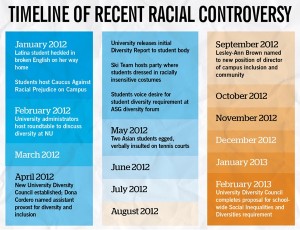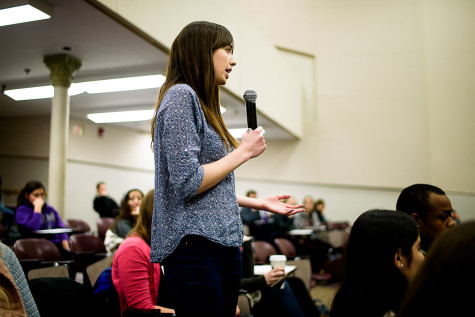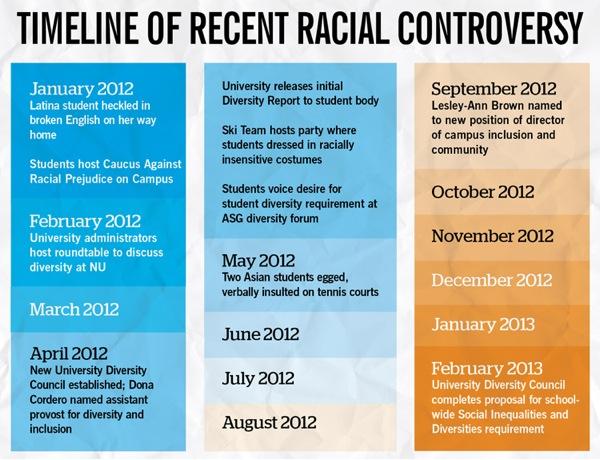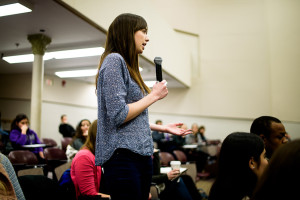Students, faculty undecided over future of Weinberg diversity requirement
September 24, 2015
Up to Date
Catch up on the biggest ongoing news stories affecting Northwestern and Evanston with The Daily’s new explainer series: Up to Date.
Following the July start date of new Weinberg College of Arts and Sciences dean Adrian Randolph, students are looking to further the conversation about implementing a U.S.-based Social Inequalities and Diversities requirement in the Weinberg curriculum.
The requirement was proposed February 2013 by the University Diversity Council, following a string of racially insensitive incidents in 2012. However, the motion met controversy this spring when members of Weinberg faculty indicated a desire to shift the proposed requirement’s U.S. focus to a more international one.
In response to the potential change in focus, Associated Student Government launched a petition to keep the proposed requirement U.S.-focused and co-hosted a student forum where student opinion was in favor of a domestic focus.
This academic year, ASG will continue its support for the U.S.-centric requirement, said Matt Herndon, ASG vice president for accessibility and inclusion.
“Obviously global perspectives are important, but seldomly do we focus on issues of social inequality based on identity that’s based … right here in the United States,” the SESP junior said. “The biggest point of the requirement (is) to get people who don’t really learn about these things at Northwestern to confront these realities that we have here.”
Dona Cordero, former assistant provost for diversity and inclusion and chair of the University Diversity Council who left NU last October, told the Daily in February 2014 that the goal of the requirement is “to interact with people who have different life experiences, who come from different cultural backgrounds in order to one, work together in the academic environment, but two, to work together in the larger society.”
Although the transition to the new dean has slowed down the implementation process, Herndon said it is important to make clear what the student opinion is to the dean and the faculty.
“We’re going to have to push the dean on getting this to the table,” he said. “I think one of the most important things … is talking to faculty members about showing up for the vote when it does happen.”
In order for the requirement to be approved, a revised proposal needs to go through a three-stage process: First, to a meeting with the Curricular Policies Committee, then to a faculty meeting for discussion and then to another faculty meeting for a vote if a consensus is reached, Mary Finn, Weinberg associate dean for undergraduate academic affairs, told The Daily in February.
Spanish and Portuguese Prof. Frances Aparicio said it is important to address diversity because NU admits a more diverse student body each year.
“That in itself is already an indication that we need to talk particularly about race, only because race is a topic so many people don’t feel comfortable talking about,” said Aparicio, who co-chaired the diversity council subgroup that drafted the 2013 proposal. “I think by giving students the tools that they need to be able to reflect and critically think about these issues on their everyday life is going to help the climate on campus.”
Although Aparicio believes the requirement will not change people’s attitudes completely toward inequality and diversity, she said she hopes it will at least springboard students into thinking about these issues in the future.
“It’s not just about (a student’s) four years on campus,” she said. “It’s about creating the tools that you need and the language and to be reflecting on ways in which we can begin to identify the social inequalities and try to do something about it.”
The proposal recommended implementation of the requirement by Fall Quarter 2015, but currently only the School of Education and Social Policy and the Medill School of Journalism, Media, Integrated Marketing Communications have such a requirement existing. If approved by all six schools, the diversity requirement would be the first University-wide undergraduate academic requirement.
The earliest the requirement will be implemented is the 2017-18 academic year, and would only affect incoming freshman that year, Finn said in February.
Despite the delay in the timeline, Aparicio said she is happy to see the progress that has been made and the commitment Weinberg is making to the requirement’s implementation.
“I do hope at some point if it happens and when it happens, both faculty and students will embrace this opportunity, because it is a unique opportunity for all of us to continue growing and to continue thinking about these issues and engaging in them,” she said.
Email: [email protected]
Twitter: @benjamindin





